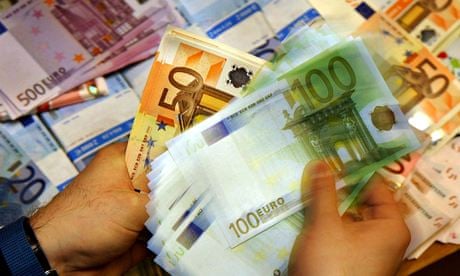The European Union is experiencing an existential crisis, as the European elections will soon brutally remind us. This mainly involves the eurozone countries, which are mired in a climate of distrust and a debt crisis that is very far from over: unemployment persists and deflation threatens. Nothing could be further from the truth than imagining that the worst is behind us.
This is why we welcome with great interest the proposals made at the end of 2013 by our German friends from the Glienicke group for strengthening the political and fiscal union of the eurozone countries. Alone, our two countries will soon not weigh much in the world economy. If we do not unite in time to bring our model of society into the process of globalisation, then the temptation to retreat into our national borders will eventually prevail and give rise to tensions that will make the difficulties of union pale in comparison. In some ways, the European debate is much more advanced in Germany than in France. As economists, political scientists, journalists and, above all, citizens of France and Europe, we do not accept the sense of resignation that is paralysing our country. Through this manifesto, we would like to contribute to the debate on the democratic future of Europe and take the proposals of the Glienicke group still further.
It is time to recognise that Europe's existing institutions are dysfunctional and need to be rebuilt. The central issue is simple: democracy and the public authorities must be enabled to regain control of and effectively regulate 21st century globalised financial capitalism. A single currency with 18 different public debts on which the markets can freely speculate, and 18 tax and benefit systems in unbridled rivalry with each other, is not working, and will never work. The eurozone countries have chosen to share their monetary sovereignty, and hence to give up the weapon of unilateral devaluation, but without developing new common economic, fiscal and budgetary instruments. This no man's land is the worst of all worlds.
The point is not to pool all our taxes and government spending. All too often today's Europe has proved to be stupidly intrusive on secondary issues (such as the VAT rate on hairdressers and equestrian clubs) and pathetically impotent on important ones (such as tax havens and financial regulation). We must reverse the order of priorities, with less Europe on issues on which member countries do very well on their own, and more Europe when union is essential.
Concretely, our first proposal is that the eurozone countries, starting with France and Germany, share their corporate income tax (CIT). Alone, each country is hoodwinked by the multinationals of every country, which play on the loopholes and differences between national legislations to avoid paying tax anywhere. National sovereignty has thus become a myth. To fight against this "tax optimisation", a sovereign European authority needs to be given the power to establish a common tax base that is as broad as possible and strictly regulated. Each country might then continue to set its own CIT rate on this common base, with a minimum rate of around 20%, and with an additional rate on the order of 10% to be levied at the federal level. This would make it possible to give the eurozone a real budget, on the order of 0.5% to 1% of GDP.
As the Glienicke group rightfully points out, this budget capacity would allow the eurozone to carry out stimulus and investment programmes, in particular with respect to the environment, infrastructure and training. But unlike our German friends, we feel it is essential that the budget of the eurozone comes from a European tax, not from contributions by the states. In these times of starving budgets, the eurozone needs to demonstrate its ability to raise taxes more fairly and more efficiently than the states; otherwise people will not grant it the right to spend. Beyond that, it is necessary to very quickly generalise the automatic exchange of banking information within the eurozone and establish a concerted policy to make the taxation of income and wealth more progressive, while at the same time jointly waging an active fight against tax havens outside the zone. Europe must help to bring tax justice and political will into the globalisation process: such is the content of our first proposal.
Our second proposal is the most important and flows from the first. To approve the tax base for the CIT, and more generally to discuss and adopt the fiscal, financial and political decisions on what is to be shared in the future in a democratic and sovereign fashion, we must establish a parliamentary chamber for the eurozone. Here too we join our German friends from the Glienicke group, though they hesitate between two options: either a eurozone parliament consisting of the members of the European parliament from the countries concerned (a sub-formation of the European parliament reduced to the eurozone countries), or a new chamber based on grouping a portion of the members of the national parliaments (eg 30 French MPs from the National Assembly, 40 members from the German Bundestag, 30 Italian deputies etc, based on the population of each country, according to a simple principle: one citizen, one vote). This second solution, which takes up the idea of a "European chamber" proposed by Joschka Fischer in 2011, is, we believe, the only option for moving towards political union. It is impossible to completely deprive the national parliaments of their power to set taxes. It is precisely on the basis of national parliamentary sovereignty that a shared European parliamentary sovereignty can be forged.
In this scheme the European Union would have two chambers: the existing European parliament, directly elected by the citizens of the EU 28, and the European chamber, representing the states through their national parliaments. The European chamber would initially involve only the countries of the eurozone that want to move towards a greater political, fiscal and budgetary union. But it would be designed to welcome all EU countries agreeing to go down this road. A minister of finance of the eurozone, and eventually an actual European government, would answer to the European chamber.
This new democratic architecture for Europe would make it possible to finally overcome today's inertia and the myth that the council of heads of state could serve as a second chamber representing the states. This wrong fable reflects the political impotence of our continent: it is impossible for one person to represent a country, unless we resign ourselves to the permanent impasse imposed by unanimity. To finally move to majority rule on the fiscal and budgetary matters that the eurozone countries choose to share, it is necessary to create a genuine European chamber, where each country is represented not by its head of state alone, but by members who represent all political persuasions.
Our third proposal directly concerns the debt crisis. We are convinced that the only way to put this definitively behind us is to pool the debts of the eurozone countries. Otherwise speculation on interest rates will renew again and again. It is also the only way for the European Central Bank to conduct an effective and responsive monetary policy, as does the US Federal Reserve (which would also be hard pressed to do its job properly if every morning it had to arbitrate between the debts of Texas, Wyoming and California). The pooling of debt has de facto already begun with the European Stability Mechanism, the emerging banking union and the ECB's Outright Monetary Transactions programme, which already affect the taxpayers of the eurozone to one extent or another. It is necessary now to go further, while clarifying the democratic legitimacy of these mechanisms.
We must restart from the proposal for a "European debt redemption fund" made in late 2011 by the council of economic experts to the German chancellor, which was designed to pool all debts exceeding a country's 60% GDP limit, and add in a political component. It is not possible to decide 20 years in advance how quickly such a fund could be reduced to zero. Only a democratic body, namely the European chamber formed out of the national parliaments, would be able to set the level of the common deficit every year, based concretely on the state of the economy.
The choices made by this body will sometimes be more conservative than we might personally wish, and at other times more liberal. But they will be taken democratically, based on majority rule, in the light of day. Some on the right would like these budget decisions to be confined to post-democratic bodies or frozen in constitutional marble. Others on the left, prior to accepting any strengthening of political union, would like a guarantee that Europe will forever carry out the progressive policies of their dreams. These two pitfalls must be avoided if we want to overcome the current crisis.
Debate over Europe's political institutions has all too often been pushed aside as technical or secondary. But refusing to discuss the organisation of democracy ultimately means accepting the omnipotence of market forces and competition and abandoning all hope that democracy can regain control of 21st century capitalism.
This new political space is crucial. Beyond macro policies or fiscal issues, our social models are a common good that we need to preserve and sustain. But they are also key to a successful inclusion in globalisation. For fiscal systems convergence to the growing concern on social investment, France and Germany initiatives or reinforced cooperation are missing the point. Twenty-eight EU lags on those subject to translate consensus into act and, when it come to money, finally fails. A European chamber would be the place where decisions are made because all implications in terms of rights and duties would be explicit. The scope for such decisions is large and one can dream of subjects to be considered: German corporate governance, by a broader power accorded to employee representatives has contributed to keep a productive sector in the crisis; childhood care for all; training; social legislation convergence; a price for CO2 emissions in order to mitigate climate change.
Many will oppose our proposals by arguing that it is impossible to amend the treaties, and that the French people do not want greater European integration. These arguments are false and dangerous. The treaties are being modified constantly, as was the case in 2012, when the matter was settled in little more than six months. Unfortunately, this was a poor reform, which reinforced a federalism that is technocratic and inefficient.
To claim that public opinion does not like today's Europe, and then conclude that there should be no change in its basic functioning and institutions, amounts to a culpable inconsistency. When the German government produces its new proposals for reforming the treaties in the coming months, nothing says these reforms will be more satisfactory than those of 2012. But rather than just sit on our hands waiting, what is needed is finally to start a constructive debate in France so that we finally have a social and democratic Europe.
Thomas Piketty Director of studies at the École des hautes études en sciences sociales (EHESS) and professor at the Paris School of Economics
Florence Autret Author and journalist
Antoine Bozio Director of the Institute of Public Policy
Julia Cagé Economist at Harvard University and Paris School of Economics
Daniel Cohen Professor at the École Normale Supérieure and the Paris School of Economics
Anne-Laure Delatte Economist, CNRS, University Paris X and OFCE
Brigitte Dormont Professor, Paris Dauphine University
Guillaume Duval Editor of 'Alternatives Economiques'
Philippe Frémeaux President, Veblen Institute
Bruno Palier Director of research, CNRS, Paris Institute of Political Studies
Thierry Pech Director general, Terra Nova
Jean Quatremer Journalist
Pierre Rosanvallon Professor, Collège de France; director of studies, EHESS
Xavier Timbeau Director of analysis and forecast department, OFCE, Paris Institute of Political Studies
Laurence Tubiana Professor, Paris Institute of Political Studies; president, Institute for Sustainable Development and International Relations








